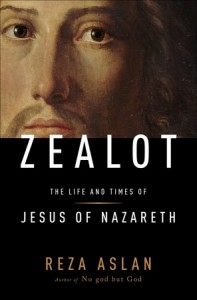Another terrific review of Aslan’s best-seller, aided by the botched Fox News interview. A few snippets:
 Zealot’s claim is essentially a conspiracy theory: Jesus was really a proclaimer of violent revolution, but the gospels and Paul covered up the evidence. Aslan then has a typical conspiracy-theory approach: any time the gospels present evidence against Aslan’s theory, they were making it up; any time the gospels present evidence in favor of Aslan’s theory, they were telling the truth. This is found countless times in Zealot ….
Zealot’s claim is essentially a conspiracy theory: Jesus was really a proclaimer of violent revolution, but the gospels and Paul covered up the evidence. Aslan then has a typical conspiracy-theory approach: any time the gospels present evidence against Aslan’s theory, they were making it up; any time the gospels present evidence in favor of Aslan’s theory, they were telling the truth. This is found countless times in Zealot ….
Perhaps not surprisingly, the claims in Zealot come with a fair degree of scholarly arrogance (which I acknowledge many scholars are prone to!). Aslan says that his goal is to “purge the scriptures of their literary and theological flourishes and forge a far more accurate picture of the Jesus of history… Everything else is a matter of faith.” In other words, when Aslan accepts some information from the gospels and rejects the rest, that is scholarly and historical; but if someone accepts other information from the gospels, their view is not scholarly or historical, but “a matter of faith.” The parts of the gospels that Aslan agrees with are historical; the parts that he doesn’t agree with are “literary and theological flourishes.” Of course, Aslan often tries to explain why he thinks that some claim in the gospels is unhistorical, but taken as a whole, it is impossible to ignore the essential arbitrariness of his choices. …
Finally, despite his generally good understanding of the field, Aslan makes a number of significant errors. I took pages of notes just on historical and linguistic errors in Zealot. Here are only a few examples of significant scholarly errors: use of Greek definitions not found in any standard Greek lexicon; using the wrong Greek lexicon for the New Testament; incorrect definition of the targumim; unawareness of the evidence for high literacy in ancient Israel; unawareness of literary approaches to the gospels; claims that violence against foreigners was the only faithful Jewish response; claims that Pilate crucified “thousands upon thousands” without trial; very late, unlikely dates for the writing of the four gospels; claims that ancient people did not understand the concept of history; claims that Luke was knowingly writing fiction, not history; claims that Mark does not describe Jesus’ resurrection; and on and on. In many cases, I had to come to the conclusion that Aslan was just not familiar enough with modern scholarship related to the New Testament.


